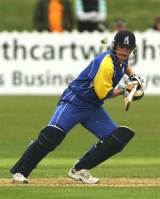
|

Luke Wright: 'He brings energy to the stage and this is an energy game'
© Getty Images
|
|
Funny as it now seems, after a decade of barely relenting hopelessness in one-day cricket, there was a time - not so long ago - when England all but ruled the world in the limited-overs game. Admittedly, they never actually won the World Cup, but in five tournaments from 1979 to 1992 they were the very model of consistency. They reached the final on no fewer than three occasions, and were never eliminated before the last four.
The reason for that relative success was simple. England played more limited-overs cricket than any other nation - starting with the Gillette Cup way back in 1963 - and consequently had more situational experience to fall back on than any other nation. Asia and Australia have since left the game's creators trailing in their wake, but suddenly there's a new kid in town. Barely four years after its inception in the summer of 2003, Twenty20 cricket has its very own World Championship. And once again, it is England that has hogged most of the experience on offer.
When England's 30-man preliminary squad was announced last month, the names were split into two very distinct camps. There were those who might be termed Twenty20 specialists - the likes of Darren Maddy, Jeremy Snape, Chris Schofield and Luke Wright, who've starred for their counties precisely because they've not been featuring for England. And then there were the established stars - the likes of Alastair Cook, Ian Bell, Andrew Flintoff and Kevin Pietersen - of whom more than just a handful have been culled from the final squad.
In years gone by, the specialists might have been included in the preliminary squad for novelty's sake, before being jettisoned at the last minute to accommodate the tried-and-trusted - you can't imagine Duncan Fletcher, for instance, condoning a complete revamp of his squad with just five days between the end of the seventh ODI against India at Lord's, and the first of England's Twenty20 matches against Zimbabwe at Cape Town.
England's chairman of selectors, David Graveney, however, signalled that a new approach had been adopted for a new era. "In the past," said Graveney, "we have said: 'This is our best group of cricketers, and they can play any form of cricket, any way, anywhere in the world.' But that may not be the case. We have had a little bit of a shift in terms of what is the way we want to play and who can fulfil the role. The guys that we have selected, who have had the opportunity to play Twenty20 cricket, are the form players."
Consequently, the selectors have taken a gamble on Schofield, who was the joint leading wicket-taker in this years' tournament with 17 scalps at 8.82. They have backed the enduring consistency of Darren Maddy, who won two titles with Leicestershire Foxes and whose tally of 1278 runs in 43 games (at a strike-rate of 134.52) makes him the most prolific English batsman in the history of Twenty20, and second only to the Australian Brad Hodge.

|

Darren Maddy: rewarded for county consistency © Getty Images
|
|
They have examined James Anderson's tendency to be erratic under pressure and given a heartwarming opportunity to another long-term outcast, Kirtley. And they have ignored the claims of Bell, Cook, and a host of familiar 50-overs stalwarts, and have instead taken a chance on the Sussex youngster Wright, who in June hurtled to a 45-ball century against the eventual tournament winners, Kent. "He's an exciting talent," said Graveney. "He brings energy to the stage and this is an energy game."
Whether the mixture is sufficient to break England's duck in global tournaments remains to be seen, but the one thing that England do have is an understanding of the dynamics of Twenty20 cricket that can only be gleaned through experience. "We have to cover the areas to attack the first six overs, and keep enough in the hutch to get the maximum runs in the last five," said Graveney, using the sort of jargon that will be alien to any nation that has not tasted Twenty20 cricket to the same extent.
England, for the first time in the long time, are pioneers in the global game. "I think it's great that the ECB has been instrumental in creating a form of the game that's now a worldwide brand," said Graveney. "And in light of the 50-over World Cup where we didn't perform to our capabilities, this is now an opportunity to show what we can do, albeit with a slightly different personnel. But there are big differences in the types of game. This form is really quick, and you need to think on your feet, have great variation and be very proactive. There's not enough time to go up to the bowler every single ball."
England have picked a side that will be self-governing. Snape, Solanki, Maddy and Kirtley will need no team orders to get on with what they do best, and in Pietersen, Collingwood and Flintoff, the selectors have dispensed with all the dawdlers from the 50-over World Cup, and left themselves only those whose batting styles brook no equivocation. How the two extremes of the squad gel remains to be seen, but in a 13-day slap-bang tournament the glory-boys and the journeymen shouldn't find it too difficult to muck in together.
Undoubtedly there will be some teams that still regard Twenty20 cricket as a gimmick - Australia, for all that they stuffed England in their recent match-up in Sydney, have not quite embraced it to the fullest extent, and India have been positively stand-offish about the concept. "But one thing's for sure," said Graveney, "when they all turn up in South Africa, they'll all be competing to win."
Andrew Miller is UK editor of Cricinfo

